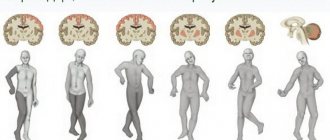Periods of night rest
The entire time of night rest is conventionally divided into two stages: the phase of slow (deep) and fast (short) sleep. First, a person experiences deep sleep, which lasts from 1.5 to 2 hours. A short sleep (also called REM sleep) for an adult lasts from 5-10 minutes. With each cycle, as we approach the moment of awakening, the slow stage becomes shorter, and the fast stage increases. In total, during the period of night rest, a person goes through 4-5 shifts of such cycles.
Use light and darkness at the right times
Light affects the body's internal clock, which regulates sleep and wakefulness. Inappropriate light exposure leads to rhythm disturbances. Lack of light stimulates the production of melatonin, an important hormone for sleep. That is why in the dark a person experiences a feeling of drowsiness. For example, with the arrival of winter, the days become shorter, it is dark in the morning and it is harder for us to get up.
During the day, be sure to be exposed to sunlight or an artificial light source. And at night, use thick curtains, turn off the nightlight and electronic devices so that the room is dark. This way, the body will not confuse when it needs to sleep and when to stay awake.
State of the body during deep sleep
In turn, deep sleep is divided into 4 stages, differing from each other in the level of awareness and electroencephalogram (EEG) indicators:
- The first stage is characterized by drowsiness and half-asleep visions, from which it is quite easy to get out.
- When the second stage begins, so-called sleep spindles (bursts of activity) appear on the electroencephalogram. The consciousness of the sleeper fades into the background, but a person can easily be awakened by any external influence.
- At the third stage, falling asleep becomes deeper and more continuous. The heart rate slows down, and slow delta waves with a length of 1-4 Hz appear.
- The stage of deepest and slowest sleep.
Often in the literature you can find a combination of the second and third stages into one - the so-called delta sleep. Completing all four stages gives you a complete and healthy rest.
The stages of delta sleep are the most important because they determine the depth of sleep. They also regulate the transition to REM sleep with dreams.
sunlight
But during the daytime, enjoy the bright sun. It has been proven that a person needs to spend at least 20 minutes a day on it. But choose not the scorching midday sun, but morning walks or the time after 4 o’clock in the afternoon, when its activity decreases. The sun is the main source of vitamin D production, without which the body cannot function at full capacity.
With a vitamin deficiency, a person experiences a loss of strength, apathy, and depression. This is most pronounced in winter, when vitamin D is not produced even under direct sunlight. If you feel deficient, take vitamin complexes.
Sunlight charges us with energy and vigor. And proper physical activity during the day allows you to get tired in the evening and fall asleep without problems. Spend more time in the sun to forget about insomnia. If you live in regions where there is little sunlight, be sure to take vitamin complexes. You can visit the so-called light rooms. The first of them opened several years ago in Novosibirsk. Special lamps are installed in the premises, which operate in a certain spectrum of rays. After visiting such rooms, a person’s condition noticeably improves and the feeling of constant fatigue disappears.
How long should the deep sleep phase last?
The average night's sleep for an adult is 7 to 9 hours. However, such indicators are conditional. So, for Napoleon to fully recuperate, it was enough to sleep 4 hours, but Einstein needed more than 9 hours.
Of all the total time of night rest, the norm of deep sleep for an adult plays the most important role, since the normal functioning of all body systems depends on it. The duration may vary depending on how old the person is. English scientists conducted a study in which 110 men and women of different ages who did not suffer from insomnia took part.
The results showed:
- The sleep of subjects aged 20-30 lasted on average 8 hours, of which the deep sleep phase was about 118 minutes.
- Participants aged 31 to 55 rested for an average of 7 hours, with a deep phase lasting 85 minutes.
- The duration of night rest for elderly subjects averaged 6.5 hours, of which deep sleep took 84 minutes.
Studies have demonstrated the importance of deep sleep for the normal state of the body at the main stages of human life, while the percentage of the length of the phase in the general cycle after 30 years decreases from 25% to 20%.
Adjust your sleeping position
There are three main poses: on your back, on your stomach and on your side. Traditionally, it was believed that it was best to sleep on your back, but it turned out that this position leads to blockage of the airways, the development of apnea and snoring. Of course, personal preferences play an important role when choosing a sleeping position, but the side position appears to be the most convenient and comfortable.
The importance of deep sleep
During this period, metabolic processes in the cells and tissues of the body are normalized. The deep phase is characterized by complete restoration of the body, preparation of internal organs and the nervous system for a new stage of wakefulness. With an increase in the ratio of fast and slow sleep, a person experiences poor health, muscle weakness, etc.
The second important function of the deep phase is the processing of all information accumulated during the day into long-term memory. This process occurs in the hippocampus and lasts several hours.
Chronic lack of sleep at night entails disturbances in the functioning of the nervous system: a person makes many mistakes at work, the efficiency of memory and thought processes decreases, and reaction speed decreases.
Fresh air in the bedroom
Another problem that causes disturbances is insufficient supply of fresh air into the room. This is especially true in the winter season, when central heating radiators dry out the air. Sometimes everything happens exactly the opposite - the apartment is too damp, and in this case, ventilation allows you to reduce the humidity level to an acceptable value of 40 - 60%.
It has been scientifically proven that a person sleeps better if the temperature in the bedroom is 18 - 20 degrees. Many people are accustomed to warmer air, which ultimately causes insomnia. Ventilate the room daily, preferably several times a day. Leave the window open for 20 – 30 minutes. If possible, keep it open all night.
More on the topic: How long before bedtime can you eat?
It is useful not only to ventilate the bedroom, but also to take a walk before going to bed. Fresh air will help saturate the body with oxygen and allow you to fall asleep faster and sleep soundly. But you shouldn’t go for a run before relaxing, as excessive physical activity interferes with relaxation.
Does quality deep sleep affect intelligence?
Compliance with deep sleep norms has a positive effect on both the quality of dreams and the functioning of mental abilities in general. This was proven by another study with the participation of volunteers: each subject, before going to bed for the night, had to remember several words that were absolutely unrelated in meaning. The results showed that participants with a longer deep sleep phase were able to reproduce significantly more target words the next morning than subjects who had a shorter deep sleep phase. Thus, reduction, disruption or complete exclusion of this stage from night's rest leads to significant memory deterioration, absent-mindedness and a decrease in the level of performance.
And despite the fact that REM sleep is easily compensated for by additional hours of rest, the loss of the deep sleep phase cannot be restored.
Don't look at your watch
Many people, when unexpectedly waking up at night, often watch the time and worry that they cannot fall back to sleep quickly. This kind of “watching” of the clock is typical for those suffering from insomnia or predisposed to it. Take the clock off the bedroom wall, and don't check your phone every 10 minutes. Try to relax and not think about time.
Awakening in the deep phase
To understand how waking up in the slow phase affects the quality of rest, it is important to understand in more detail what deep sleep is and what passing through the delta phase means.
During this period, the body receives maximum relaxation due to the fact that reactions to the outside world are completely eliminated. Energy reserves are restored as much as possible. The nervous system does not respond to external stimuli, including sharp sounds and smells.
Awakening at this stage of rest is accompanied by complete disorientation in space and time. The person feels lost, unable to determine the time and his location. Such an awakening is also accompanied by poor health, a feeling of weakness and fatigue, and the inability to remember dreams and events that occurred before falling asleep.
At the physical level, the malaise turns into high blood pressure and a sharp headache.
Lower the temperature
A person's body temperature changes when he falls asleep. At the torso it decreases, and at the arms and legs it increases. If the room is hot, it is difficult to sleep. Make sure that the temperature in the house in the evening is from +15 to +23°C. Everyone has personal preferences, so choose the ideal indicators for yourself.
A warm shower will also change your body temperature. Your body will relax and suddenly begin to cool down when you leave the bathroom, and your brain will receive a signal that it’s time to fall asleep.
Causes of delta sleep disturbance
The causes of disturbances in deepest sleep may include the following:
- Jumps at the psycho-emotional level can lead to chronic stress. A psychotraumatic factor contributes to the appearance of disturbances in the process of falling into sleep and the onset of the delta phase. Mental illnesses often lead to difficulty falling asleep: depression, bipolar affective disorder, etc.
- Diseases of the internal organs, since symptoms at the physiological level interfere with normal sleep and night rest in general. Constant pain causes a person to constantly wake up at night due to continuous discomfort. Men may suffer from frequent urination.
If the disruption of the delta stage does not exceed 1-2 nights, there is no need to worry: these are often short-term disruptions that quickly disappear on their own.
However, if such deterioration is observed regularly, you should consult a specialist to avoid negative consequences.
Medications
Many people mistakenly believe that the easiest and most effective way to improve their sleep is through medications. In some cases, their use is indeed justified and necessary, but only if you have been diagnosed with insomnia and a doctor has prescribed a remedy for it.
Buying and drinking sleeping pills on your own is strictly contraindicated. Many of them quickly become addictive, and after withdrawal, insomnia returns again.
When used correctly, only natural and multivitamin preparations are harmless, they regulate the normal functioning of the entire body and thus improve the quality of sleep:
- Multivitamin complexes. They normalize vitamin and mineral balance, increase physical activity, and help fight chronic fatigue.
- Magnesium preparations. With a lack of magnesium in the body, a person becomes nervous, easily excitable, and has difficulty falling asleep. But its overdose is also harmful. Therefore, before taking magnesium supplements, it is better to do a detailed blood test.
- Melatonin. Now on pharmacy shelves there are preparations containing the ready-made sleep hormone melatonin. They help you fall asleep quickly, but you can’t use them all the time. By receiving melatonin from the outside, the body will stop producing it on its own.
- Plant extracts: valerian, motherwort, mint. They have a calming effect and promote the rapid onset of deep, sound sleep.
Important! We urge you to pay special attention to barbiturates. They are banned in most developed countries, but are still widely used and sold without prescription.
These drugs (Barboval, etc.) cause rapid addiction and degeneration of brain cells. In fact, they can be classified as narcotic drugs. If you continue to take them, stop immediately!
What signs indicate that a person does not get enough night rest?
If a person has problems falling asleep, feels unwell after waking up and generally suffers from a lack of rest at night, this is accompanied by the following symptoms:
- weakness, fatigue, decreased level of performance throughout the day;
- decreased mental activity;
- loss of muscle tone;
- apathy, increased irritability, bad mood and depression;
- complete lack of motivation.
Follow the schedule
The body has its own regulatory system - the circadian rhythm. The internal clock gives signals to the body that it needs to be awake and in the same way gives signals that it needs to sleep. Waking and going to sleep at the same time helps create an accurate biological schedule.
Once your body adjusts to the schedule, it will become easier to fall asleep in a short time. Sleep 7-9 hours every night - this is the optimal amount of rest for adults. Also, give yourself a rest before going to bed. Half an hour or an hour of relaxation will help you prepare for the night.
Is it possible to plan sleep stages?
Based on the research, scientists confirmed the possibility of calculating the phases of night rest. For this, the number of hours for proper rest and several conditions are important: moderate physical activity throughout the day, the time of natural falling asleep and waking up without an alarm clock.
If a person needs 8 hours for proper rest, and the duration of one cycle is 1.5-2 hours, you can determine the moment of the beginning of the paradoxical phase, when awakening will be the easiest and most pleasant.
In a simplified version, the full cycle consists of 4 phase changes: nap, delta sleep, deep and REM sleep.
Table of deep sleep norms per night for an adult:
A simplified version of calculating what time to go to bed:
For an individual calculation, it is important to observe and determine the duration of your cycle, based on the period of sleep and an analysis of how you feel when you wake up.
Switch to herbs
Usually doctors, when you complain to them about poor sleep, write a prescription for medicine. This is a quick, simple and effective solution to the problem, but, alas, temporary. Sleeping pills have side effects. Some drugs are addictive, you can no longer sleep without them and need large doses of the drug. In addition, in the morning you may wake up not rested, but with a heavy head. So, ditch the sleeping pills and try the gentler herbal supplements available on the market. Look for preparations containing valerian. This is a traditional sedative supplement that helps normalize poor sleep. However, do not expect “quick” results: you may have to take the drug for at least three weeks to feel the effect. It is also good to drink chamomile tea before bed. Chamomile, like valerian and lavender, has been used for centuries to relieve nervous tension and as a sleep aid. Place some fresh or dried chamomile flowers or a few drops of essential oil under your pillow.
How to Increase Deep Sleep Time
The duration of deep sleep can be increased. To do this, you need to follow several important recommendations:
- Falling asleep and waking up should be easy and natural.
- Before falling asleep, you must completely eliminate smoking, drinking alcohol, coffee, and energy drinks. It is better to limit yourself to a snack that is easy on the stomach (fruit, kefir or a cup of tea) a few hours before falling asleep.
- To improve the passage of the delta phase, it is better to give the body some moderate physical activity 3-4 hours before going to bed.
- To quickly fall asleep, you can use relaxation music or sounds of nature. Research has shown that the sound of crickets is particularly beneficial for the delta phase. It is important to choose the background music wisely: it should not be excessively loud, as this will only increase the load on the brain during sleep and interfere with the full recovery of the nervous system.
- Fresh air also has a good effect on the duration of the delta phase: 10-15 minutes before falling asleep, it is best to ventilate the room, and also get rid of any possible sources of noise and loud sounds.
By following these rather simple but important rules, you can not only extend the stage of deepest sleep, but also improve its quality.
Use special breathing techniques
The 4-7-8 breathing technique is a simple but powerful secret that will allow you to calm down and relax. This will also help you get ready for sleep, as it will slow down your nervous system. Practice the technique any time you want to overcome personal feelings or cope with a stressful situation:
1. Place the tip of your tongue behind your upper front teeth. 2. Exhale completely through your mouth and make a loud sound. 3. Close your mouth and breathe in through your nose, counting to four in your head. 4. Hold your breath and mentally count to seven. 5. Open your mouth and exhale completely, making a loud sound and silently counting to eight. 6. Repeat this cycle at least three more times.
Recommendations from somnologists
Professional somnologists advise using simple techniques to increase the duration of deep sleep:
- Optimize your nighttime rest routine and make it a habit (without occasionally interfering with daytime sleep, etc.).
- Create the most comfortable conditions in the bedroom: eliminate noise, irritating light sources, ensure optimal temperature and humidity.
- Introduce the use of aromatic oils and meditation, taking a warm shower or walking in the fresh air before falling asleep.
Any procedures that will help increase body temperature by 1-2 degrees 2-3 hours before going to rest are suitable. At the moment of falling asleep, it will automatically lower: this will strengthen the delta phase and speed up the body’s regeneration process.
Watch what and when you eat
The food you eat before bed affects it. Eating high carbohydrate foods is detrimental to a good night's rest. Even if you fall asleep quickly, it will not be a good night.
Include more fats (nuts, cheese, cottage cheese) in your diet. If you still want to eat carbohydrate foods, do so four hours before going to bed.












